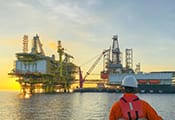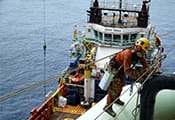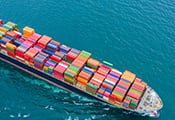Types of Transportation Modes
To fully protect goods in transit, it's essential to understand the unique risks associated with each mode of transportation. Let's explore these methods and the specific challenges they pose.
Sea Transportation
Sea transportation is the primary mode of international shipping, with goods transported over long distances by ocean freight. This method involves moving goods via large cargo ships, which are commonly used for international trade due to their cost-effectiveness in transporting bulk goods. Freight refers to the goods or cargo transported, while ocean freight refers to goods shipped via sea.
Transit insurance covers ocean freight by safeguarding goods from the inherent risks, including the perils of the sea, such as storms, rough waters, and other unforeseen maritime hazards that can damage cargo during transit.
Common Risks Covered:
- Natural Disasters: Storms, hurricanes, and rough seas are frequent threats to cargo during ocean transportation.
- Accidents: Ships may collide with other vessels, submerged objects, or icebergs, causing damage or loss of goods.
- Piracy: Certain regions, such as near the Horn of Africa, are prone to piracy, where hijacking or theft of goods occurs.
Example: In 2022, a cargo ship carrying electronics worth ₹4 crore encountered a severe storm in the Indian Ocean. Marine insurance covered the loss after some containers were swept overboard, ensuring the business recovered without financial disruption.
Air Transportation
Air transportation is used for high-value or time-sensitive goods that require fast delivery. Air freight refers to goods transported via aeroplanes, and this method is often chosen for its speed and efficiency. However, the risks associated with air transport, such as handling issues or turbulence, necessitate marine insurance to ensure full protection.
Common Risks Covered
- Turbulence: Sudden jolts during the flight can cause damage to goods, particularly fragile items.
- Handling at Airports: Goods are at risk of damage or mishandling during loading and unloading at airports.
- In-flight Incidents: Technical malfunctions such as fires, depressurisation, or cargo hold issues can damage the goods in transit.
Example: A company shipping luxury watches by air faced a significant loss when several items were damaged due to turbulence mid-flight. Cargo Insurance compensated the company ₹1.5 crore for the damaged goods, ensuring business continuity without financial disruption.
Land Transportation
Goods transported overland by trucks or trains - known as road freight or rail freight - are also covered by marine insurance. This type of coverage mainly applies to domestic transportation within the country's border, ensuring goods remain protected throughout their journey.
Rail Freight
This mode of transport is particularly useful for bulk cargo. Marine insurance can cover goods transported by rail, protecting them against various risks.
Common Risks Covered:
- Derailment: Train accidents can lead to significant cargo damage.
- Collisions: Accidents involving vehicles or objects on the tracks can damage cargo.
- Theft: Goods can be stolen during transit or while stored at rail yards.
Example: A shipment of industrial machinery parts was damaged during a derailment. Marine insurance covered ₹2 crore in damages, allowing the company to meet its contractual obligations without incurring financial losses.
Road Freight
Trucks, vans, and other vehicles are commonly used to transport goods over shorter distances, especially for deliveries within a country or region. Transit insurance also extends its coverage to these shipments.
Common Risks Covered:
- Road Accidents: Collisions, rollovers, and other road accidents can damage cargo.
- Vehicle Overturning: Top-heavy or unevenly loaded cargo is susceptible to overturning, causing damage.
- Theft: Goods can be stolen during transit or while parked at rest stops.
Example: A truck carrying a shipment of furniture from Maharashtra to Madhya Pradesh overturned due to a highway accident, resulting in damage to some of the furniture pieces. Marine insurance covered the repair or replacement costs of the damaged items.
Inland Waterways Transportation
In regions with extensive river and canal networks, barges and boats are used to transport goods. This mode of transport is often preferred for bulk cargo or goods that need to reach locations inaccessible by road or rail. Marine insurance covers goods transported on these inland waterways.
Common Risks Covered:
The different types of marine losses covered in inland waterways transportation are as follows:
- Flooding: Rising water levels in rivers can lead to cargo damage or total loss.
- Accidents: Collisions with bridges, other vessels, or obstacles in the water can cause significant damage to cargo.
- Obstructions: Delays and potential damage can occur when waterways are blocked by debris or other obstructions.
Example: A shipment of construction materials being transported via a river barge suffered damages when the barge collided with a bridge. Marine insurance covered ₹35 lakh in damages, allowing the supplier to proceed with their project without major financial losses.
Multimodal Transportation
Many modern shipments rely on multimodal transportation, which involves combining different transportation modes—such as sea, air, rail, and road—to move goods from their origin to their destination. Transit insurance plays a critical role in ensuring continuous protection across all modes, covering risks at every stage of the journey.
When shipments move between different transportation modes, the risk of damage, loss, or delay increases, especially at transfer points where goods are handed off from one carrier to another. Transit insurance ensures that goods remain protected throughout the entire multimodal journey.
Unique Risks Covered:
- Transfer Points: Increased risk of damage or loss during the transition between transportation modes (e.g., from ship to truck or plane to train).
- Coordination Issues: Delays or miscommunication between carriers can lead to mishandling or loss of goods.
Example: A pharmaceutical company used a multimodal shipment involving air and road transport to deliver temperature-sensitive drugs. During the transition from air to road, a mishandling incident led to the spoilage of some goods. Marine insurance covered ₹60 lakh in losses, allowing the company to recover quickly without financial strain.
Key Considerations for Choosing the Right Coverage
Selecting the right policy is crucial to avoid underinsurance and ensure adequate protection for your cargo. The nature of the goods being transported and the frequency of transit can significantly influence the type of coverage required.
Type of Goods:
- Fragile or High-Value Items: These may necessitate extra coverage options like All-Risk protection, increased insured values, or clauses addressing professional packing/handling and temperature-sensitive transport.
- Route and Destination: The specific route and destination can impact the risks involved. For example, shipments passing through piracy-prone waters or high-theft areas may necessitate additional coverage.
Policy Type:
- Single Transit Policy: Ideal for one-time shipments, offering coverage for a specific journey.
- Annual Open Policy: Suitable for businesses that regularly transport goods, providing ongoing coverage for multiple shipments throughout the year.
How Does Transit Insurance Protect Against Financial Loss?
Marine/transit insurance acts as a financial safety net, safeguarding businesses against the potentially devastating financial losses associated with cargo damage or loss during transit. By transferring the risk to the insurer, businesses can focus on their core operations without the constant worry of unforeseen events disrupting their supply chains.
Conclusion
Transit insurance offers comprehensive protection across various modes of transportation, ensuring that businesses remain safeguarded against the unique risks involved in moving goods by sea, air, land, or inland waterways. By securing the right coverage, businesses can mitigate financial losses and ensure uninterrupted operations. For expert advice on choosing marine insurance for your business, visit Policybazaar for Business and connect with an expert today







































 Expert advice made easy
Expert advice made easy


